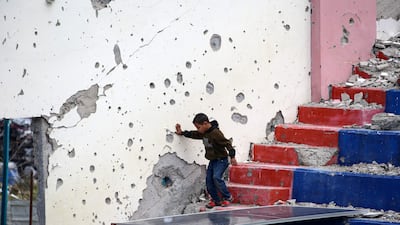Living in the UAE – surrounded by smart cities, autonomous drones, and AI-powered services – I’m reminded of how easy it is to take technology for granted. Yet, this abundance underscores the stark contrast with the millions of children and young adults disconnected from the tech world, where digital education’s potential to bridge inequality remains unmet.
This connectivity chasm is most pronounced in conflict zones, where schooling serves as a fragile lifeline. As we continue to address critical challenges in education across the Arab region, we must confront this widening gap and galvanise efforts – local, regional, and global – to turn equitable education from aspiration into achievement.
Consider Shahd, a university student in Gaza who dreams of becoming a multimedia professional. Her efforts to reach this goal are nothing short of Herculean. With her university in ruins, Shahd relies on an online programme, navigating power outages and the arduous trek to a makeshift internet hotspot in a nearby displacement camp. Meanwhile, Mahmoud, a law student in rural Egypt, shares a single smartphone with his family of eight, scrounging for moments of connectivity to further his studies.
These stories are emblematic of a broader crisis. According to Unicef, over 37 million children across the Middle East and North Africa lack access to digital learning due to inadequate infrastructure, economic instability, and conflict. The divide is stark: urban centres benefit from burgeoning EdTech ecosystems, while students in rural and conflict-affected areas contend with outdated resources.

Technological advancements have revolutionised learning globally, offering dynamic opportunities for students to engage with cutting-edge tools and knowledge. But these benefits remain unevenly distributed. In Gaza, Libya, and Lebanon, systemic inequalities compounded by conflict exacerbate educational inequities, jeopardising not only individual futures but the economic recovery of entire regions.
In conflict zones, education is nearly always a first casualty of war. The deliberate targeting of schools and universities, termed “scholasticide”, has left countless students without safe spaces to learn. Gaza alone has seen more than 300 schools damaged or destroyed over the past 15 months. The ripple effects extend far beyond the physical loss of infrastructure.
That’s where digital education comes in. The story of Maya, a 14-year-old Syrian refugee in Lebanon, underscores its transformative potential. Displaced by war, Maya struggled to keep pace with her peers. With the help of the Abdul Aziz Al Ghurair Refugee Education Fund and War Child Holland, she received a tablet and access to a tailored online curriculum. Today, she dreams of becoming a scientist. “I never thought I would love learning this much,” she says, her enthusiasm a testament to the power of inclusive education initiatives to change lives.
These programmes showcase the resilience of students and the vital role of partnerships in closing educational gaps. Organisations such as The Digital Schools and Unicef work with local communities to provide accessible, culturally relevant education, restoring hope and opportunity where it’s needed most. Localised collaboration ensures impactful support reaches those who need it the way they need it.
Access to quality education is a cornerstone of the United Nations Sustainable Development Goals (SDGs). Goal 4 seeks to “ensure inclusive and equitable quality education and promote lifelong learning opportunities for all.” In the Arab region, however, the digital divide hinders this vision. For marginalised youth, particularly those in conflict-affected areas, accessing even basic education remains a daunting challenge. The barriers are even steeper for acquiring the digital skills necessary for future employment and active participation in a rapidly evolving global economy.
Many places are still recovering from the aftermath of the Covid-19 pandemic, which exposed the fragility of educational systems worldwide, with the Arab region among the hardest hit. This crisis amplified the need for resilient educators and scalable EdTech solutions capable of bridging these gaps. Equally important is addressing the systemic inequities that continue to limit digital access, and ensuring that every young person, regardless of their circumstances, can thrive in the digital age.
This is not merely nice to have; it is an economic sustainability argument. Investing in education yields substantial economic benefits locally, regionally and globally. The World Bank reports a global 9 per cent increase in hourly earnings for every additional year of schooling. This illustrates the critical role of education in driving economic growth and reducing poverty.
In the context of the Arab region, bridging the digital divide and ensuring access to quality education are not just social imperatives but also economic necessities. By equipping youth with the necessary skills and knowledge, countries can foster economic development, reduce unemployment, and enhance competitiveness in the global market.
Addressing these challenges requires a multifaceted approach, including investing in digital infrastructure, developing inclusive educational policies, and fostering public-private partnerships to create scalable and sustainable solutions. Only through such comprehensive efforts can the Arab region fully harness the economic potential that education offers.
Philanthropy has emerged as a powerful catalyst for change, mobilising resources and fostering innovation to bridge the digital divide. Strategic investments can and do transform lives at scale. This goes beyond infrastructure investment, which remains critical. These are investments in efforts to develop culturally relevant content and support systems tailored to marginalised communities’ unique contexts. By prioritising these areas, governments, civil society, and private sector leaders can create an ecosystem that supports sustainable educational development.
Bridging the digital divide is not merely a technological challenge – it is a moral imperative. The stakes are too high for inaction. Shahd, Mahmoud, Maya, and countless others deserve more than fleeting sympathy – they deserve meaningful, sustained action. Organisations like The Digital Schools and Unicef must deepen partnerships with local communities, delivering culturally relevant, accessible education that restores hope and opportunity.
Our collective future depends on our collective resolve. By uniting around this goal, we can transform the promise of digital education into a reality for every child, regardless of their circumstances. The time to act is now.



